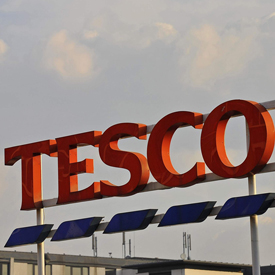Worst UK sales for Tesco in 20 years
As Tesco reports its worst performance in the UK for 20 years, despite a boost in growth outside the UK, experts warn Channel 4 News there is no reason for consumers to start spending.

Tesco said like-for-like sales in the UK – excluding VAT and petrol – fell by 0.9 per cent in the three months to August 27, the third successive quarterly decline.
It is the worst six-monthly sales performance for the supermarket in the UK in 20 years.
The picture is a little brighter in the UK when new store openings and sales of petrol are taken into account – Tesco’s total sales, which also include VAT, grew by 7.1 per cent to £23.4bn in the last quarter.
However the retail giant warned that it was operating in “the most challenging retail market we have seen for a generation”, adding to fears that Britons are cutting back on spending in the bleak economic climate.
UK customers, obviously, are having a very tough time. Tesco Finance Director Laurie McIlwee
Tesco’s Finance Director Laurie McIlwee said: “UK customers, obviously, are having a very tough time.”
Tesco boss Phil Clarke said that higher UK petrol prices were also a factor and had taken a heavy toll on British shoppers, with customers spending an extra £750m on filling up their cars in the first half compared with the same time last year. Tesco’s performance in the UK was also dragged down by low demand for electronics and entertainment items, which are two of its largest product groups.
Outside of the UK, Tesco’s profits were given a boost by growth in the Europe and Asia markets and there was an overall 6.2 per cent rise in the company’s profit to £1.9bn in the half-year.
Meanwhile Sainsbury’s, one of Tesco’s main rivals, reported a 1.9 per cent rise in like-for-like sales in the 16 weeks leading up to October 1, excluding petrol sales. Unlike Tesco, its figures include VAT.
The retailer announced that its 400 convenience stores, which continue to grow at a rate of 20 per cent, helped to boost total sales by 7.8 per cent. Sainsbury’s hailed the figures as a “good sales performance”.
‘Life is difficult’ for consumers
The figures from Tesco and Sainsbury’s highlight British consumers’ reluctance to spend amid rising food prices, reduced disposable incomes and a rise in inflation rates.
They suggest that the government’s austerity drive, combined with a stricken European economy, is hitting consumers where it hurts.
Justin King, chief executive of Sainsbury’s, said he expected consumers’ modest spending to continue.
“Our planning assumption is that the current state of affairs will persist for some time to come, partly because there’s no economic reason why consumers are likely to start to change their behaviour,” he said.
More than one pound in every ten is spent in Tesco, and the retailer’s muted growth will add to fears that the economy is not recovering fast enough.
The current state of affairs will persist, partly because there’s no economic reason why consumers are likely to change their behaviour. Justin King, Sainsbury’s CEO
Richard Perks, director of retail research at Mintel International told Channel 4 News: “It’s very tough out there and people are really reluctant to spend. People are cutting back, incomes are being squeezed, people are worried about the future. All in all, life is difficult.”
Competition among the ‘big four’
Mr Perks also said that Tesco’s poor performance in comparison with Sainsbury’s is partly as a result of the profile of their customers.
“Tesco is underperforming at the moment. Its customer base is suffering more than Sainsbury’s – it’s more down-market and slightly younger,” he said.
In an attempt to compete, Tesco has pledged £500m towards its Big Price Drop campaign, which will reduce the price of 3,000 lines including staple items such as milk, bread, fruit and vegetables.
Tesco’s “disappointing” figures are also a result of increased competition with rival supermarket Asda, said Mr Perks.
“They’ve been upstaged by Asda in the whole pricing issue,” he said.
-
Latest news
-
As India goes to the polls in the world’s largest election – what do British-Indians think?6m

-
Tees Valley: Meet the candidates in one of the biggest contests coming up in May’s local elections4m

-
Keir Starmer says public sector reform will be a struggle7m

-
Nicola Sturgeon’s husband Peter Murrell charged with embezzlement of funds from SNP1m

-
Ukraine might finally get $60billion in American weapons and assistance to defend against Russia3m

-




